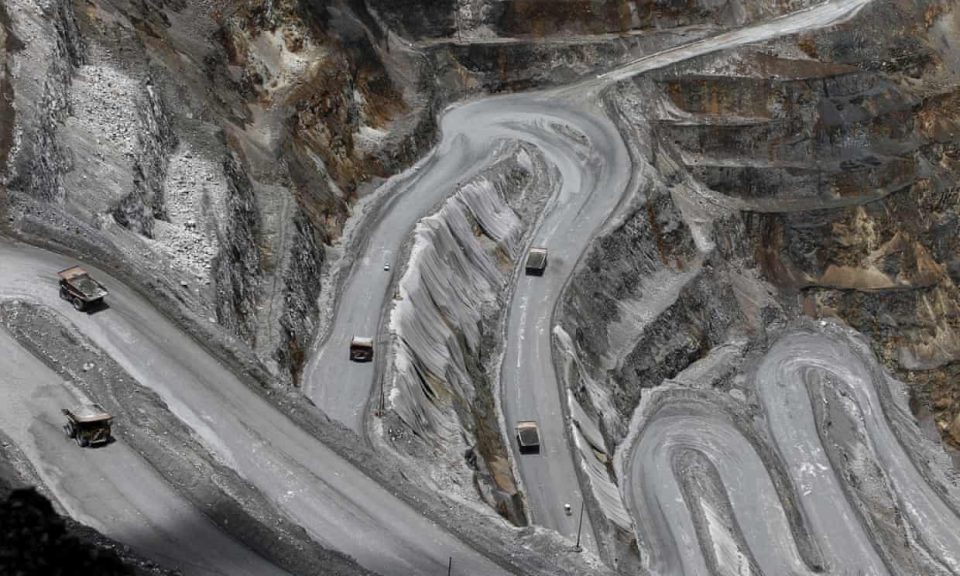Activists have cautioned the London Metal Exchange (LME), recognized as the largest metals market worldwide, that it may be violating legal statutes by facilitating the trade of copper sourced from one of the most contentious mines globally.
They argue that the environmental damage caused by the operations at the Grasberg mine, situated in the conflict-ridden highlands of Papua, Indonesia, would likely be deemed illegal in many other regions around the globe. The mine’s operator, PT Freeport Indonesia (PTFI), refutes these assertions vehemently.
Despite these claims, copper products, including cathodes derived from the Grasberg mine, are routinely traded on the London exchange, which presents itself as “the global hub for industrial metals trading.” From the LME, these products enter various international supply chains.
Located in the western highlands of New Guinea, within the vicinity of the third-largest rainforest remaining on the planet, the Grasberg mineral district is a vital source of both copper and gold.
However, since its inception in the late 1960s, Grasberg has been permitted to utilize a “riverine tailings management system,” which allegedly releases around 200,000 tonnes of mining waste into the headwaters of the Ajkwa river delta each day.
The ore extracted from the mine is pulverized to a fine consistency and mixed with water to create a slurry, which is then treated with chemicals that cause the gold, copper, and silver minerals to separate and rise to the surface.
Once these commercially valuable minerals are removed, the remaining finely crushed rock particles, referred to as tailings, are disposed of in a nearby river, ultimately flowing downstream into the Ajkwa delta floodplain.
PTFI asserts that it has constructed levee systems designed to manage the deposition of what is projected to be approximately 3 billion tonnes of tailings by the mine’s closure in 2041.
Indigenous Papuans have reported that since the mine commenced operations in 1973, their communities have faced severe poverty, illness, oppression, and environmental degradation.
A 2020 assessment of the mine’s tailings revealed the presence of hazardous substances such as arsenic, cadmium, lead, mercury, and cyanide. Furthermore, a 2016 study published in Nature indicated that the extensive volume of waste has been responsible for “forest inundation and degradation of water bodies crucial to Indigenous peoples.”
In 2016, a local tribal leader noted that sedimentation from the mine had elevated the riverbed near his village, diminishing the populations of fish, oysters, and shrimp essential to his community’s diet and economy.
In response, PTFI highlighted to The Guardian that ensuring the safe and effective management of tailings is among their top environmental priorities. They claim, “The tailings management system from the Grasberg mine has complied with all necessary environmental regulations and has been operational for nearly three decades. External reviews continue to affirm that this approach is the most environmentally responsible given the specific site conditions.”
“We are committed to responsible production, adhering to leading international environmental standards and technologies across all our facilities, including Grasberg,” they added.
On Monday, members of the London Mining Network (LMN) and the Global Legal Action Network (GLAN) sent a letter to the LME and the Financial Conduct Authority (FCA), urging that copper derived from Grasberg may be implicated in money laundering activities.
They contend that disposing of mining waste in this manner would qualify as a serious legal violation if it occurred in the UK, suggesting that copper from the mine could be characterized as “criminal property” under the Proceeds of Crime Act (POCA).
“The London Metal Exchange serves as the global center for metals and critical minerals trading,” remarked Stéphanie Caligara, a GLAN attorney.
“As the demand for metals like copper increases with the push for a ‘green transition,’ the exchange has a legal obligation to ensure that the metals traded on its platform are not produced through environmental violations.
“The exchange also plays a key role in maintaining the integrity of global supply chains. Consequently, the FCA, as the exchange’s regulator, needs to investigate any potential laundering of criminal proceeds occurring on the exchange.”
In their correspondence, the campaigners inform the LME that it is required to alert the National Crime Agency regarding any suspected money laundering activities on its platform to facilitate an investigation. Last year, they sought a judicial review over the trading of Grasberg copper but were instructed that they must first lodge a complaint directly with the LME and the FCA before pursuing such legal action.
Caligara continued, “GLAN has noted similar trends with mining firms operating in Brazil, Peru, Guinea, and Russia, among others, marketing their outputs on the London Metal Exchange.”
“Should GLAN and LMN succeed, it might prompt these companies to reassess their mining practices in these countries. This change could subsequently lessen environmental damage linked to mining and significantly enhance the living conditions of affected communities.”
According to the LME’s official site, beginning in 2024, all products listed on the exchange must adhere to responsible sourcing guidelines set by the Organisation for Economic Co-operation and Development and the International Organization for Standardization.
It is believed that even if the exchange had raised concerns regarding the production of any listed product, it would be unable to disclose those concerns publicly.
An LME spokesperson declared, “The LME is committed to fulfilling its regulatory responsibilities and has established appropriate measures to ensure compliance with these obligations, including those related to POCA.”
PTFI has not responded to requests for comment.


